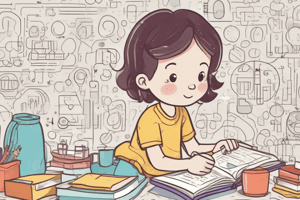Podcast
Questions and Answers
What is the percentage of an adult brain weight at birth?
What is the percentage of an adult brain weight at birth?
- Seventy-five percent
- Fifty percent
- Twenty-five percent (correct)
- Ten percent
Which stage of cognitive development is characterized by the use of symbols to represent words, images, and ideas?
Which stage of cognitive development is characterized by the use of symbols to represent words, images, and ideas?
- Intuitive thought substage
- Preoperational stage (correct)
- Sensorimotor stage
- Operational stage
What is the term for the smallest unit of sound that makes a meaningful difference in a language?
What is the term for the smallest unit of sound that makes a meaningful difference in a language?
- Phoneme (correct)
- Syntax
- Semantic
- Morpheme
What is the term for the area in the left hemisphere near the motor cortex responsible for language production?
What is the term for the area in the left hemisphere near the motor cortex responsible for language production?
At what age can children typically walk upstairs with alternating feet without holding the rail?
At what age can children typically walk upstairs with alternating feet without holding the rail?
What is the term for the ability to recognize that moving or rearranging matter does not change the quantity?
What is the term for the ability to recognize that moving or rearranging matter does not change the quantity?
What is the term for the error in which a child thinks that everyone sees things from their own perspective?
What is the term for the error in which a child thinks that everyone sees things from their own perspective?
What is the term for the stage of speech development in which children use one word to convey a whole sentence or idea?
What is the term for the stage of speech development in which children use one word to convey a whole sentence or idea?
Which of the following describes Vygotsky's Sociocultural theory of cognitive development?
Which of the following describes Vygotsky's Sociocultural theory of cognitive development?
Which of the following is NOT a characteristic of Piaget's theory of cognitive development?
Which of the following is NOT a characteristic of Piaget's theory of cognitive development?
What is an example of categorical self?
What is an example of categorical self?
What is an example of delayed gratification?
What is an example of delayed gratification?
Who believed that personality is formed during the first few years of life?
Who believed that personality is formed during the first few years of life?
What is the stage of cognitive development where children can think logically and perform operations on real objects?
What is the stage of cognitive development where children can think logically and perform operations on real objects?
What refers to the set of rules we use to obtain meaning from morphemes?
What refers to the set of rules we use to obtain meaning from morphemes?
Which of the following is a characteristic of egocentrism?
Which of the following is a characteristic of egocentrism?
Flashcards are hidden until you start studying
Study Notes
Cognitive Development
- The first stage of cognitive development is referred to as the sensorimotor stage.
- At birth, the brain is about 25% of its adult weight, and this is not true for any other body part.
- Infants older than 6 months can retain information for longer periods and need less reminding to retrieve information from memory.
Language Development
- Phoneme is the smallest unit of sound that makes a meaningful difference in a language.
- Holophrastic speech is a stage of language development where children use one word to convey a whole message (e.g., "popis" for toothpaste).
- Broca's area is an area in front of the left hemisphere near the motor cortex, responsible for language production.
Motor Skills
- At 3 years old, children can develop gross motor skills, such as kicking a ball without losing balance, and having better coordination, getting arms, legs, and body to work together.
- Children may walk upstairs with alternating feet (without holding the rail) by this age.
Stages of Cognitive Development
- The preoperational stage is characterized by children using symbols to represent words, images, and ideas.
- The operational stage is where children can think logically and perform operations on objects that are real.
- Substages of cognitive development include intuitive thought substage and symbolic function substage.
Cognitive Development Theories
- Vygotsky's Sociocultural theory of cognitive development emphasizes the role of social interactions with adults in facilitating a child's potential for learning.
- Piaget's theory believes that development stems directly from the child and acknowledges intrinsic development, and children may be given opportunities to discover concepts on their own.
Self-Concept
- Categorical self refers to the way children describe themselves in terms of social categories (e.g., "I am friendly").
Social Learning
- Delayed gratification is a concept where children learn to wait for a reward instead of giving in to immediate temptation.
- Response inhibition is the ability to control one's impulses and not act on them.
Personality Development
- According to Freud, personality is formed during the first few years of life, and we learn how to manage our instincts and transform them into socially acceptable behaviors.
Linguistics
- Semantics refers to the set of rules we use to obtain meaning from morphemes.
- Morphemes are the smallest units of language that carry meaning.
Studying That Suits You
Use AI to generate personalized quizzes and flashcards to suit your learning preferences.




